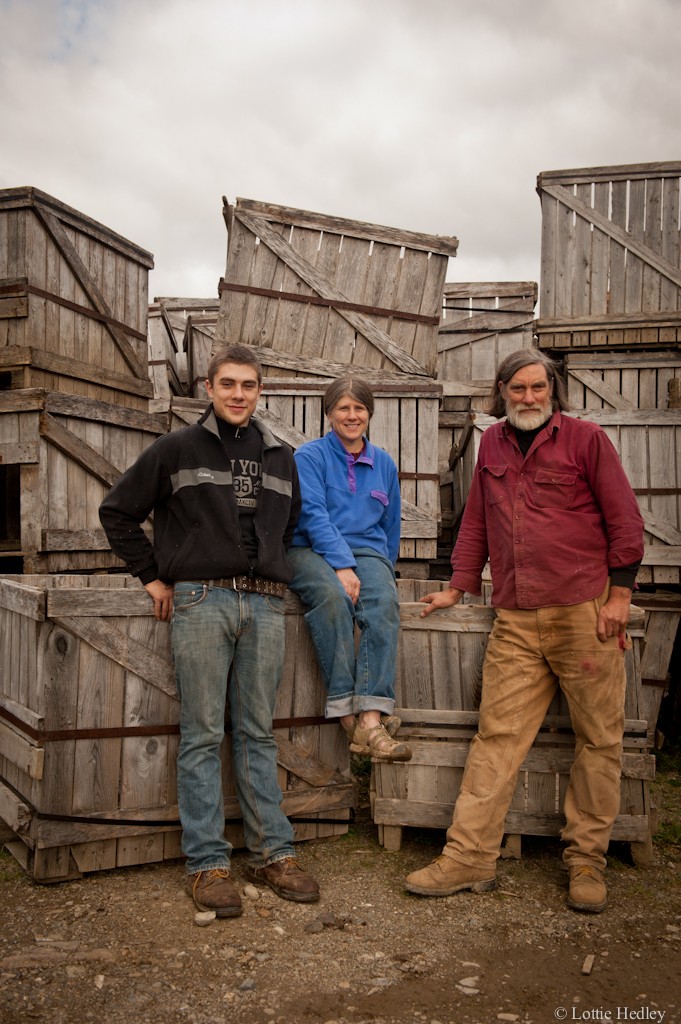Wood Prairie Farm, owned by Jim Gerritsen, is a first generation organic seed farm in Bridgewater, Maine. Jim, his wife and four children work close to 56 acres of cropland every year and have always stressed high quality and certified organic seed. As President of the Organic Seed Growers and Trade Association, Jim is at the center of an action against the corporate giant Monsanto in an effort to protect the rights of family farmers. Jim’s also become a powerful voice in the Occupy movement as farmers and eaters organize to take back our food system.
Growing up in west coast suburbia, Jim’s life in the city just didn’t seem to live up to the childhoods of his parents. His dad grew up on an apple farm in Yakima, Washington, and his mother was also raised on a family farm. Frequent trips to visit his dad’s family in Yakima got Jim interested in farming, and after working on a few different farms to make money during college, he decided it was his true passion in life. “I figured out pretty quickly that I wanted to own my own farm,” he said. He decided to make the transition cross-country to upstate Maine, in a border town just minutes away from New Brunswick, Canada. At that time in 1976, farmland in Northern Maine cost just $150 per acre, and some of the land in the area even went for as low as $50—a far cry from today’s land prices! Why would someone choose to farm in a town touching the Canadian border? Jim said it was all about the soil, and that northern Maine has the best soil in New England.
On his 115-acre spread, Jim’s main crop is certified organic seed potatoes, but he also grows other seed crops, including wheat, rye, corn and vegetables like squash and tomatoes. The seed potatoes and other seeds are sold retail through the Gerritsen’s mail order catalog and online at the farm’s website. Additionally, they wholesale to several national mail order seedhouses.

The farm is truly family operated, and Jim has found something for everyone to do on a daily basis. For the younger kids, “They started putting stamps on the catalogues to mail out before they even had any coordination,” he said, resulting in a batch of letters with upside down and crooked stamps scattered around the mailing room. As they have gotten older, the kids have moved on to more physically demanding tasks, and the 5 A.M. alarm is no longer considered a nuisance. Now that his oldest son has turned 21, Jim says that the next ten years will determine which children want to stay on the farm, and which will want to pursue a life elsewhere. However, he notes, the lessons the kids have learned growing up on the farm have set them up well for anything else they’d like to do. From a very early age, they have learned valuable lessons in work ethic, their relationship to the earth, and time management; they have been able to watch the entire “field to fork” process unfold before their eyes. Jim explains with enthusiasm, “When you love what you are doing, and you are able to share that with your family, it is really satisfying work.”
As an organic farmer and President of the Organic Seed Growers and Trade Association, Jim has taken a definitive stance against genetically engineered (GE) seeds that are flooding the market. In fact, he is the lead plaintiff in an upcoming lawsuit against the corporate seed giant, Monsanto, on behalf of more than 300,000 farmers and eaters across the country. The case, Organic Seed Growers & Trade Association, et al. v. Monsanto, was filed in federal district court in 2011. Plaintiffs in the suit represent a broad array of family farmers, small businesses and organizations from the organic agriculture community who are increasingly threatened by genetically engineered seed contamination despite their best efforts to avoid it.
The main threat of GE seeds to farmers is that Monsanto’s technology cannot be contained once it’s out in farm fields. “Monsanto has a lack of desire to control the pollution of their transgenic seeds onto organic farms,” Jim explained. Natural pollination and movement of seeds from one place to another allows contamination of organic and non-GE farms by Monsanto’s patented technology. If crops on a farm are contaminated, the farmer of those crops becomes liable for patent infringement of Monsanto’s technology. What’s more, organic farmers can lose their organic certification since use of GE technology is strictly prohibited from organic production. Between 1997 and April 2010, Monsanto has filed 144 lawsuits against American farmers in at least 27 different states and has settled another 700 cases out of court for undisclosed amounts of money. In the process, farms have been foreclosed upon and many farmers have settled for bankruptcy for something that they had no desire to be a part of and over which they had no control.
Jim and the other farmers in the suit don’t want financial compensation from Monsanto. What they want is court protection from unfair patent infringement lawsuits. They believe they should not be held responsible for Monsanto genetics that “trespass” on their farms, or the litigation costs that farmers must pay to defend themselves when Monsanto sues them. They choose not to plant GE seed and they should have the right not to have GE pollen invading their farms.
In the Occupy Wall Street movement, Jim saw a way to tie his work to a greater cause: ending corporate control in our country. “What’s apparent to me is that we have a broken system,” he said, and explained that if enough people engage the system, a true democracy will always follow the dictates of its citizens.
On December 4, 2011, Jim joined hundreds of farmers and eaters at the Occupy Wall Street Farmers March to tell his story and raise awareness about corporate control of our food. Farmers, including Jim, spoke about big business pushing family farms out of business, and the change that is needed to take back our land and food. Of the trip to New York City—Jim’s first trip to New York—Jim said,”There is a lot more commonality with urban America and rural America than what I had originally thought.” He explained that farmers in both the country and the city are recognizing that corporate control of our food system will be its demise, and that something needs to change very soon. Monsanto and the other corporate giants are quickly pushing past the grips of regulation, and we cannot continue to let them weed out the family farms that make this country strong.
“When you love what you are doing, and you are able to share that with your family, it is really satisfying work.”
Jim continues, “In order to make a change, we all need to get out of our comfort zones. For me, this meant traveling to New York City. If everyone can get out and support their local Occupy movements, the politicians will have to listen. We need to get the power back to the people, away from the corporations, and let them know that we are no longer willing to accept the status quo.” Jim’s speech, which you can watch below, rallied the hundreds present in Zuccotti Square and many thousands more online. His passion and involvement demonstrate that we all have a role to play in the Occupy movement.
The lawsuit against Monsanto begins next week in New York, where Jim and 300,000 strong hope to secure the rights of non-GE farmers and the interests of eaters across America. Jim hopes he will be part of an impactful lawsuit that may be a model for the future of reigning in corporate control in America.
“It is particularly evident to those of us who have children. If you extrapolate this out for another generation, we are going to be on the verge of losing everything,” he explained. “If something is going to be done about corporate control in our food system, now is the time to act.”



